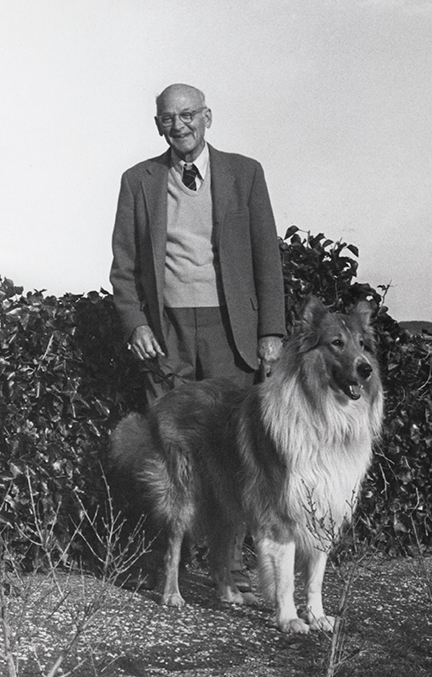Great-uncle Henry
By John Hough, Jr.

Photo of Henry Beetle Hough and his collie Graham by Edith Blake
His walking gait was steady, dogged, tireless, and it brought to mind the lope of a good distance runner. That looseness. That open stride. In his seventies, a slight limp set in, but it did not slow him down, and my great-uncle, into his eighties, could walk for miles.
He walked all over Edgartown—to and from the Gazette office, to the harbor lighthouse, twice daily around Sheriff’s Meadow Pond. He drove up-island regularly and hiked the woods of North Tisbury and the shore to the west of Cedar Tree Neck. There was always a dog with him, a big shaggy collie, on a leash in Edgartown, trotting ahead on the woodland trails of the north shore. It was here, on these winding trails and ancient cart roads, that he most loved to walk.
Henry was much loved himself, but occasionally I heard complaints about my great-uncle. The complaints all boiled down to his hostility to growth and development, his battles with developers, which were waged with eloquence and passion in the Gazette. These crusades of Henry’s, in the opinion of his critics, were perverse. “Henry Hough’s against all change, whether it’s good or bad,” an Islander once grumped to me, as if Henry were the mindless enemy of all of the inevitable changes time brings. As if he made no distinctions.
He did, of course. His critics misunderstood the man, and did so wilfully, I believe. What they chose to see as perverseness in Henry was principle—an allegiance to a sacrosanct value, and a refusal to budge from it. I go back to those walks in the North Tisbury woods, and Henry’s pleasure in them. I remember him stopping on an old cart road in the Cedar Tree Neck Sanctuary, at a place where the road begins its climb up a steep ridge. It was a bright day in May, and the oaks had just leafed out, almost shining in their new, delicate jade-green foliage. A little stream whispered along the foot of the ridge, passing under the road through an ancient culvert. “These beautiful woods,” Henry said, looking about with a kind of wonder, as if he’d just discovered them, their beauty endlessly revealing itself. This was love: of the natural world, its timelessness, its immaculacy, its mystery.
If you love something, you try—if you have the courage and the will—to protect it. You try to save it from alteration and destruction. Why wouldn’t you? Henry came to the Vineyard to live permanently in 1922, and as the decades passed the natural world of the island came more and more under assault. Encroachments were inevitable, as Henry well knew; the question was how much open land could be saved. And then, how much should he try to save? The answer, to this man of principle, was: as much as possible. Every acre is precious. Every acre lost, is lost forever.
This devotion of Henry’s was only marginally self-interested, and this is the point that his critics were and are unable or unwilling to grant. It is true that Henry found daily enjoyment in protected open land, and that its beauty gladdened him personally. But if at some point he’d been housebound in Edgartown, or even somewhere off-Island, unable ever again to walk in wood or field, he would have fought to save as much of those woods and fields as he could, in any way he could. You do not have to enter a forest to love it. Just knowing it is there is enough.
I won’t claim that a concern for future generations motivated Henry particularly, though he surely considered the fact that we and our descendants would benefit by his legacy, and was surely glad of it. That was good, but ancillary; he stood up for the natural world for that one irreducible reason: he loved it. Love animated him. It drove him.
Late in life he joined a fight against a developer who wanted to fill in wetlands between the Harbor View Hotel and the Edgartown Lighthouse and construct tennis courts on the site. There was Island-wide opposition to this project, but the developer’s ire was concentrated, perhaps because of their frequent prior disagreements, on Henry Hough. The developer’s attacks on Henry, as the fight went on, became personal and silly. He complained that Henry was “a college-educated off-islander” whose newspaper, the Gazette, had been given to him as a wedding present.
An off-islander, maybe, but Henry had been on the Vineyard for more 50 years. It is true that the Gazette was a wedding present from Henry’s father, a career New Bedford newspaper editor, and it is also true that Henry attended the Columbia School of Journalism and won a special Pulitzer Prize while he was there. I have no idea where the aspersion lies in “college-educated.” The Conservation Commission, at any rate, said no to the tennis courts. The developer blamed Henry Hough above all others.
I still think about this fight, and my great-uncle’s part in it. Henry would have known he had only a decade or so to live; why this war over an acre or two of wetlands which he would be lost to him soon enough? Why the aggravation? Why subject yourself to vitriol and snide remarks? But I’ve already answered that. Henry died in 1985, content in knowing that the wetlands and white sands above Edgartown Harbor would survive him for—who knows?—a millennium or more. Henry Hough abounded in love, and not just for woods and meadows and pristine shore, but that is for another time.
John Hough, Jr. is the author of six novels, including “Seen the Glory: A Novel of the Battle of Gettysburg” and “Little Bighorn.”

